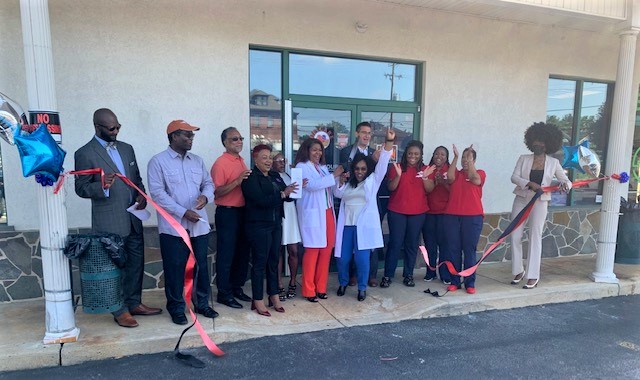If it wasn’t clear before, the COVID-19 pandemic shined a bright light on why many communities need Black Chambers of Commerce. We witnessed, in real time, as small Black-owned businesses were disproportionately denied emergency funding to keep them above water.
“It highlighted the disparity that Black businesses were facing, because with certain bailouts, many Black businesses didn’t qualify,” said Ayanna Khan, a Middletown-based Black business owner who launched the Delaware Black Chamber of Commerce (DEBCC) in December. “Businesses like mine, their doors were closing at a higher rate. At the beginning of the pandemic, Black businesses were closing at a 41% rate vs 17% for white businesses.”
Khan’s consulting company did receive funds from the Payroll Protection Program (PPP), with no employees other than herself. One of the big barriers to access with PPP, she says, was misinformation. Other Black business owners told her they couldn’t apply because they had “no payroll,” something that was untrue, even for the first round that notoriously shut out Black business owners.
“If you pay yourself, that’s your payroll,” said Khan, in an interview with Technical.ly. “When I got that PPP report last year and out of almost 1200 small businesses in the state only 14 listed on the spreadsheet were Black, I said, oh no, I have to do something.”
Unfortunately, she found that others in the business community responded less urgently to the situation than she did.
“Being involved with other chambers and sitting on the board, it wasn’t a concern for many,” she said. “But it was a concern for me. So I did some research and found that there were two Black Federations in the country: The National Black Chamber Federation and the US Black Chamber Federation. The National Black Chamber was super supportive, they said they’d never had a Black Chamber here in Delaware out of 160 chapters across the country. They partnered me with the New Jersey chapter and the Illinois chapters and I got the ball rolling, basically hit the ground running in December.”
The first priority was to help minority-owned businesses get that emergency funding.
“Our first partnership was with the State of Delaware with the Delaware Relief Grant,” Khan said. “Minorities were being rejected at a higher rate, so we partnered with them, and the Delaware Black Chamber was able to provide technical assistance to 127 businesses for almost $2 million in funding. We basically formed a lean staff of volunteers, making sure that the applications were done correctly and they would get the funding.”
A partnership with Customer’s Bank, a regional, minority-run bank, enabled the DEBCC to help 86 of its members apply for PPP funding of over $400,000.
Small businesses are the backbone of our economy, and they can bridge the wealth gap for minorities,.
“We’ve been doing lots of webinars, Zoom calls, training through the SBA and the state, educating our members,” Khan said. “We gave two of our members in the hospitality industry, who were hit hard by the pandemic, a $2,000 grant each. Today, we’re at 165 members and just continuing providing resources, education, training and advocacy for minority business. We are all inclusive, but we are very intentional about providing resources for minorities because there are so many systemic barriers in place across all industries, and we want to highlight those and assist with active change.”
And while opening celebrations are part of what they do — they held two just this week — it isn’t the priority, she said.
“A chamber of commerce has to be more than ribbon cutting. It has to provide resources, so if a business says ‘I can’t afford rent,’ it should be able to advocate for those people so they don’t have to close their doors. And that’s really what we’ve been doing: here’s some capital, here’s some resources, we will go to bat for you so you can keep your business. Small businesses are the backbone of our economy, and they can bridge the wealth gap for minorities, because we are so far behind. It’s not that we’re not smart and innovative. We’re just lacking in resources and opportunities.”
Recently, the DEBCC launched EnrichDelaware!, a business growth initiative, with Wilmington Alliance and Cornerstone West CDC. For information on how to join the DEBCC, go to debcc.org.







